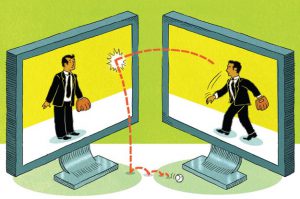
Collaborate with Mexico in the Fourth Industrial Revolution
In the new issue of Americas Quarterly, we asked people, “What would you tell the next U.S. president about Latin America?” To see other authors’ responses, click here. Leer en español Dear Mister / Madam President, Trade and U.S.-Mexico relations have been singled out as targets in this year’s election campaign, but the rhetoric overlooks … Read more

Support “Silicon Valley Diplomacy” in Latin America
Leer en español In the new issue of Americas Quarterly, we asked people, “What would you tell the next U.S. president about Latin America?” To see other authors’ responses, click here. Dear Mister / Madam President, World leaders regularly travel to Washington, New York City, Houston — but no visit is more coveted or anticipated … Read more

Venezuela’s Zika Outbreak May Be 150 Times Worse Than Reported, Study Says
When it comes to the Zika virus’ impact on Venezuela, it’s the government’s word versus Google and Twitter. Based on data gathered in part from the search engine and social network, the watchdog health group Observatorio Venezolano de la Salud (OVS) estimates that nearly 700,000 people have been infected with Zika in Venezuela. That’s around 150 … Read more

Four Great Corruption-Killing Apps
CandiDatos CandiDatos.gt is a Guatemalan platform that profiles political candidates, helps register voters, and fights corruption by enforcing transparency. When citizens contact candidates through the website, the responses are tracked and ranked. A 10-question survey enables voters to identify the candidate who most coincides with their ideas, helping them to make informed choices. To date, … Read more

¡Crear o Morir! La esperanza de Latinoamérica y las cinco claves de la innovación
Drones that deliver pizzas, 3-D printers that produce shoes, and space tourism that seeks to start a colony on Mars. These are a few of the innovations under way or on the drawing board that Andrés Oppenheimer, award-winning Miami Herald columnist and author of seven books, uses to illustrate how the world is fundamentally changing— … Read more

Privacy Is a Human Right: Data Retention Violates That Right
In March 2015, the United Nations Human Rights Council endorsed the creation of a special rapporteur on privacy. The landmark resolution1, spearheaded by Brazil and Germany and cosponsored by 46 states, including 10 other Latin American countries, gives the right to privacy the international recognition and protection it deserves. For Latin America, this resolution couldn’t … Read more

Can digital sharing economy platforms pull Latin America’s informal sector into the mainstream? Yes
The struggle between old and new forms of economic development, and efforts to strike a balance between them, will be a defining feature of society and business in the future. The sharing economy is still a poorly understood concept.1 It has been defined as “an economic system in which assets or services are shared between … Read more

Can digital sharing economy platforms pull Latin America’s informal sector into the mainstream? No
A bloated informal sector has long been a nagging structural problem in Latin America and in the developing world more generally. However, over the past few decades, it has proliferated as a result of the withdrawal of the state from market and social regulation. In particular, it has grown as governments have undertaken structural adjustment … Read more

Can Mexico City’s Regulations Help Uber Gain Footing Elsewhere in Latin America?
Two months ago, hundreds of frustrated taxi drivers blocked traffic in Mexico City to call for government regulation of mobile-based car services like Uber. On Wednesday, those regulations arrived, as the city announced a slew of new rules to regulate the rapidly-growing industry. But despite a list of regulations that includes new permit fees and a 1.5 percent tax … Read more
Cuba’s Internet: scarce, expensive and still censored
Cuba still lags far behind its Latin American counterparts on internet access, despite this week’s announcement that the government will provide Wi-Fi access to 35 state-run computer centers. Since the country’s first, humble 64kbit/s connection was established in 1996, not much has changed. Only 3.4 percent of Cuban households are connected, and a mere five … Read more
Monday Memo: Guatemalan Protests—Costa Rican Discrimination—Chinese Investment—Guyana Election—Technology in Honduras
Demonstrators Call for Pérez Molina’s Resignation: Thousands of protestors marched across 13 cities in Guatemala on Saturday to call for President Otto Pérez Molina’s resignation. The protests came as a response to a customs tax fraud scandal uncovered by the Comisión Internacional contra la Impunidad en Guatemala (International Commission Against Impunity in Guatemala—CICIG) in April … Read more

Disrupt Latin America
Microfinance revolutionized the financial services sector in Latin America over 40 years ago. Millions of individuals who were excluded from traditional financial institutions obtained access to a variety of financial products and services for the first time. Inevitably, there were gaps in coverage. In recent years, various players have been looking beyond microfinance to find … Read more

Interview: Javier Olivan, Facebook
Facebook began in 2004 as an online social networking service for students at Harvard University. Since then, it has grown into a global enterprise worth over $200 billion, with more than 1 billion active users. In July 2014, the company launched Internet.org, with telecom and other industry partners, in an effort to broaden access to … Read more

Medical 3D Printing
With its recent transformation from fringe technology to mainstream commodity, 3D printing has been hailed as the next Industrial Revolution. The ability to design and manufacture goods at low costs could fundamentally change the way we produce and consume. Although still in its infancy, the 3D printing revolution has already transformed our daily lives—from 3D-printed … Read more

Decoding the Digital Cold War
Among the pressing issues raised by the historic thaw in U.S.–Cuba relations is the role the Internet might play as the two nations enter a new chapter in their shared history. Cuba has one of the lowest Internet penetration rates in the Western hemisphere. Government data suggests that over 25 percent of Cubans are using … Read more


